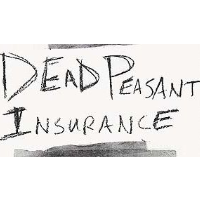“Ghoulish” OC Newspaper Owner Takes out Life Insurance on Employees

Things are getting a bit snappish between the Los Angeles Times and the Orange County Register, the newspaper to the south whose parent company is planning to launch an L.A. competitor any day now.
Los Angeles Times columnist Michael Hiltzik thinks Freedom Newspapers, owner of the Register, is acting “ghoulish” by taking out insurance policies on its employees that don’t directly benefit them. Register publisher Aaron Kushner thinks Hiltzik should stuff it, and the Times is a, “reminder of the kind of newspaper and journalism of which we want no part.”
The fuss is over corporate-owned life insurance (COLI). When Winn-Dixie Stores Inc. took out life insurance on its 36,000 employees in 1996 and named itself beneficiary without telling them, it referred to the policies, in internal memos, as “dead peasant” insurance.
That was unfortunate, but not until 2002 when Wall Street Journal reporters unearthed the memos for a series of stories on the abused corporate practice, whose nickname is said to have been inspired by Russian author Nikolai Gogol’s “Dead Souls,” a novel about a 19th century con man buying technically dead serfs to use as collateral in business deals.
COLI has since been refined—for instance, employees now have to give consent—and is used by at least 200 major corporations to fund pensions and other forms of deferred compensation. They also get a tax break, originally doled out to companies that took out life insurance policies on top executives to protect against catastrophic loss. The loophole has been vigorously exploited since the 1980s.
Not everyone approves of the practice. Filmmaker Michael Moore mocked “dead peasant” insurance in “Capitalism: A Love Story,” featuring a family who went into debt when the mom, a 26-year-old Walmart employee, died. Meanwhile, the company collected $81,000 in insurance. Young women employees are considered particularly valuable because their long life expectancy brings a bigger payoff.
In a spirited response to Hiltzik, Kushner asserted that “life insurance is not ghoulish . . . nor are the people who buy it.” He also argued that the company did not benefit because “the sole beneficiary is the pension plan.” Kushner said insurance “was created to benefit the people we love and care about most. That is why it exists. And in our particular case, that is exactly why we are buying it. We care about you, your spouses and your families.”
Hiltzik responded that he didn’t say there was anything wrong with insurance, only the ghoulish kind, and it is disingenuous to say the company didn’t benefit just because it wasn’t a “beneficiary.” In addition to tax breaks, money flowing into the pension from insurance policies on dead present and former employees relieves them of their responsibility to fund it.
Although laws governing “dead peasant” insurance were tightened up in 2006, the Wall Street Journal reported in 2009 that banks were still able to hold policies on hundreds of thousands of workers and direct the proceeds to “informal pension funds for executives. Companies deposit money into the contracts, which are like big, nondeductible IRAs, and allocate the cash among investments that grow tax-free. Over time, employers receive tax-free death benefits when employees, former employees and retirees die.”
The reporter, Ellen E. Schultz, wrote, “Efforts to rein in the practice largely have been unsuccessful, including the most recent rules Congress enacted in 2006.”
–Ken Broder
To Learn More:
Orange County Register Owner Blasts Los Angeles Times’ Story on His “Ghoulish Strategy” (Jim Romenesko)
O.C. Register Boss Resents Being Labeled a “Ghoul” (by Michael Hiltzik, Los Angeles Times)
The O.C. Register’s Supremely Ghoulish Financial Strategy (by Michael Hiltzik, Los Angeles Times)
Dead Peasants’ Insurance Frequently Asked Questions (McClanahan Myers Espey LLP)
Banks Use Life Insurance to Fund Bonuses (by Ellen E. Schultz, Wall Street Journal)
Companies Profit on Workers' Deaths Through “Dead Peasants” Insurance (by Ellen E. Schultz and Theo Francis, Wall Street Journal)
- Top Stories
- Controversies
- Where is the Money Going?
- California and the Nation
- Appointments and Resignations
- Unusual News
- Latest News
- California Forbids U.S. Immigration Agents from Pretending to be Police
- California Lawmakers Urged to Strip “Self-Dealing” Tax Board of Its Duties
- Big Oil’s Grip on California
- Santa Cruz Police See Homeland Security Betrayal in Use of Gang Roundup as Cover for Immigration Raid
- Oil Companies Face Deadline to Stop Polluting California Groundwater





